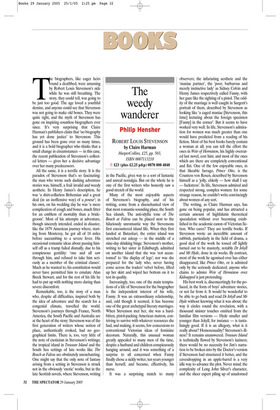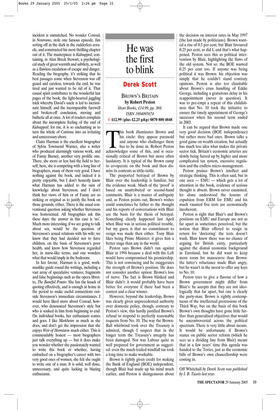The weedy wanderer
Philip Hensher
ROBERT LOUIS STEVENSON by Claire Harman HarperCollins, £25, pp. 503, ISBN 0007113218 ✆ £23 (plus £2.25 p&p) 0870 800 4848 The biographers, like eager heirs round a deathbed, were amassing by Robert Louis Stevenson’s side while he was still breathing. The story, they could tell, was going to be just too good. The age loved a youthful demise, and anyone could see that Stevenson was not going to make old bones. They were quite right, and the myth of Stevenson has gone on inspiring countless biographers ever since. It’s very surprising that Claire Harman’s publishers claim that ‘no biography has yet done justice’ to Stevenson. This ground has been gone over so many times, and it is a bold biographer who thinks that a small change in circumstances — in this case, the recent publication of Stevenson’s collected letters — gives her a decisive advantage over her many predecessors.
All the same, it is a terrific story. It is the paradox of Stevenson that’s so fascinating: the man who wrote such dashing adventure stories was, himself, a frail invalid and weedy aesthete. In Henry James’s description, he was ‘a shirt-collarless Bohemian and a great deal (in an inoffensive way) of a poseur’; in his own, on his wedding day he was ‘a mere complication of cough and bones, much fitter for an emblem of mortality than a bridegroom’. Most of his attempts at adventure, though sincerely intended, ended in disaster, like the 1879 American journey where, starting from Monterey, he got all of 18 miles before succumbing to a severe fever. His occasional romantic ideas about passing himself off as a tramp failed dismally, due to his conspicuous gentility: ‘one and all saw through him, and refused to take him seriously as a member of the criminal classes’. Much as he wanted to, his constitution would never have permitted him to emulate Alan Breck Stewart, and for the rest of his life he had to put up with nothing more daring than severe discomfort.
Remarkable, too, is the story of a man who, despite all difficulties, inspired both by the idea of adventure and the search for a congenial climate, travelled the world. Stevenson’s journeys through France, North America, the South Pacific and Australia are at the heart of the story: Stevenson was of the first generation of writers whose notion of place, authentically evoked, had no geographical limits. There is, too, very little of the note of exoticism in Stevenson’s writings; the tropical island in Treasure Island and the South Sea settings of late works like The Beach at Falesa are obstinately unenchanting. One might say that the only note of fantasy arising from a setting in Stevenson is struck not in the obviously ‘exotic’ works, but in the late Scottish novels, where Stevenson, writing in the Pacific, gives way to a sort of fantastic and unreal nostalgia. But on the whole he is one of the first writers who honestly saw a good stretch of the world.
Many of the most enjoyable aspects of Stevenson’s biography, and of his writing, come from a disenchanted view of that most romantic-sounding place, the South Sea islands. The anti-idyllic tone of The Beach at Falesa can be placed next to the hilariously unromantic way the Stevensons first encountered island life. When they first landed at Butaritari, the entire island was stretched out asleep — in the middle of a nine-day drinking binge. Stevenson’s mother, writing to her sister in Edinburgh, admitted on another island that she was ‘not accustomed’ to ‘the display of legs’; nor was she prepared for the lady who, never having come across the traders’ velvet before, lifted up her skirt and wiped her bottom on it to test its quality.
Increasingly, too, one of the main temptations of a life of Stevenson for the biographer is the independent interest of his wife, Fanny. It was an extraordinary relationship, and, odd though it seemed, it has become one of the great archetypal literary marriages. When Stevenson met her, she was a hardbitten, pistol-packing American matron, contriving to survive with whatever resources she had, and making, it seems, few concessions to conventional Victorian ideas of feminine decorum. Naturally, this unusual woman greatly appealed to many men of the time, despite a husband and children conspicuously hanging around, and it was something of a surprise to all concerned when Fanny finally chose a sickly writer, ten years younger than herself, and became, effectively, his nurse.
It was a surprising match to many observers; the infuriating aesthete and the ‘maniac partner’, the ‘poor, barbarous and merely instinctive lady’ as Sidney Colvin and Henry James respectively called Fanny, with her gaze like the sighting of a pistol. The oddity of the marriage is well caught in Sargent’s portrait of them, described by Stevenson as looking like ‘a caged maniac [Stevenson, this time] lecturing about the foreign specimen [Fanny] in the corner’. But it seems to have worked very well. In life, Stevenson’s admiration for women was much greater than one would have predicted from a reading of his fiction. Most of his best books barely contain a woman at all; you can tell the effort the ones in Weir of Hermiston, his highly overrated last novel, cost him; and most of the ones which are there are completely conventional and flat. One of the few enjoyable ones, in that likeable farrago, Prince Otto, is the Countess von Rosen, described by Stevenson himself as a ‘jolly, elderly — how shall I say — fuckstress’. In life, Stevenson admired and respected strong, complex women: for some strange reason, he couldn’t write convincingly about women of any sort.
The writing, as Claire Harman says, has gone on being popular, and has attracted a certain amount of highfalutin theoretical speculation without ever becoming established in the academic canon of Victorian fiction. Who cares? They are terrific books. If Stevenson wrote an incredible amount of rubbish, particularly in the field of drama, a good deal of the work he tossed off lightly turned out to be masterly, notably Dr Jekyll and Mr Hyde, done in six weeks. By contrast, most of the work he agonised over has either disappeared, like Prince Otto, or is admired only by the seriously dedicated; anyone who claims to admire Weir of Hermiston over Kidnapped is just pretending.
His best work is, disconcertingly for the pofaced, in the form of boys’ adventure stories, or not far from it. It would be wonderful to be able to go back and read Dr Jekyll and Mr Hyde without knowing what it was about; the way it circles round the revelation, with a thousand sinister touches omitted from the familiar film versions — Hyde smaller and younger than Jekyll, for instance — is tantalisingly good. If it is an allegory, what is it really about? Homosexuality? Stevenson’s illness? It remains unanswered. Treasure Island is technically flawed by Stevenson’s laziness; there would be no necessity for Jim’s narration to be broken into by the Doctor’s version if Stevenson had structured it better, and the eavesdropping in an apple-barrel is a very idle way to advance the plot. Never mind; the complexity of Long John Silver’s character, and the sheer expert piling up of unadorned incident is unmatched. No wonder Conrad, in Nostromo, stole one famous episode, Jim setting off in the dark in the rudderless coracle, and constructed his most thrilling chapter out of it. The masterpiece is Kidnapped, containing, in Alan Breck Stewart, a psychological study of great warmth and subtlety, as well as a flawless escalation of escape and danger. Reading the biography, it’s striking that its best passages come when Stevenson was off guard and careless; towards the end, he was tired and just wanted to be rid of it. That casual spirit contributes to the wonderful last pages of the book; the light-hearted juggling trick whereby David’s uncle is led to incriminate himself, and the incomparable farewell and broken-off conclusion, moving and bathetic all at once. A lot of readers complain about the incomplete feeling of the end of Kidnapped; for me, it is so enchanting as to turn the whole of Catriona into an irritating and unnecessary chore.
Claire Harman is the excellent biographer of Sylvia Townsend Warner, also a writer who produced alarmingly various work, and of Fanny Burney, another very prolific one. There, she more or less had the field to herself; here, she is competing with a long line of biographers, many of them very good. I have nothing against the book, and indeed it is pretty enjoyable, but I don’t honestly know what Harman has added to the sum of knowledge about Stevenson, and I don’t think her views of him or of Fanny are so striking or original as to justify the book on those grounds, either. There is the usual conventional question asking whether Stevenson was homosexual. All biographies ask this these days: the answer in this case is ‘no’. Much more interesting, if we are going to talk about sex, would be the question of Stevenson’s sexual relations with his wife; we know that they had decided not to have children, on the basis of Stevenson’s poor health, and know how Stevenson regarded her, in nurse-like terms, and one wonders what that would imply in the bedroom.
In her favour, Harman is a good, workmanlike guide round the writings, including a vast array of speculative ventures, fragments and false beginnings such as the opera libretto, The Baneful Potato. She has the knack of quoting effectively, and is enough at home in the period to make useful connections outside Stevenson’s immediate circumstances. I would have liked more about Conrad, however, who denounced Stevenson’s style but who is soaked in him from beginning to end. On individual books, her enthusiasm comes and goes. I like Markheim as much as she does, and don’t get the impression that she enjoys Weir of Hermiston much either. This is commendably honest — most biographers just talk everything up — but it does make you wonder whether she passionately wanted to write this book or whether, having embarked on a biographer’s career with two very good ones of women, she felt she ought to write one of a man. It is solid, well done, unnecessary, and quite lacking in blazing enthusiasm.
















































 Previous page
Previous page